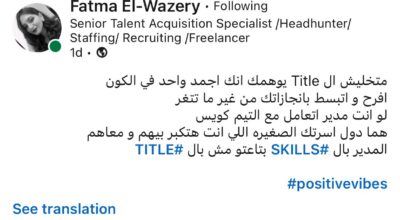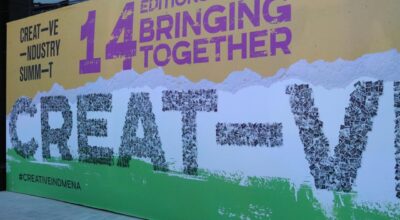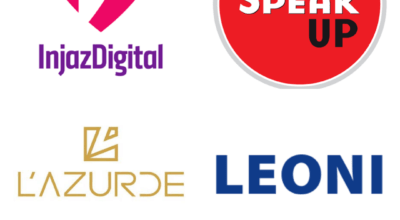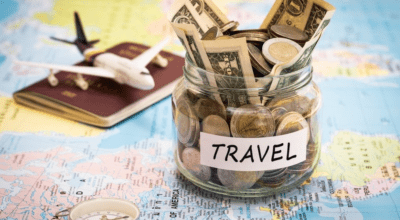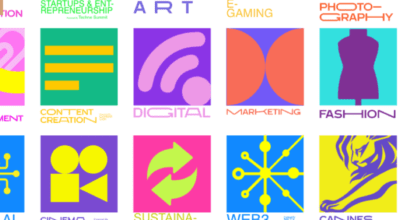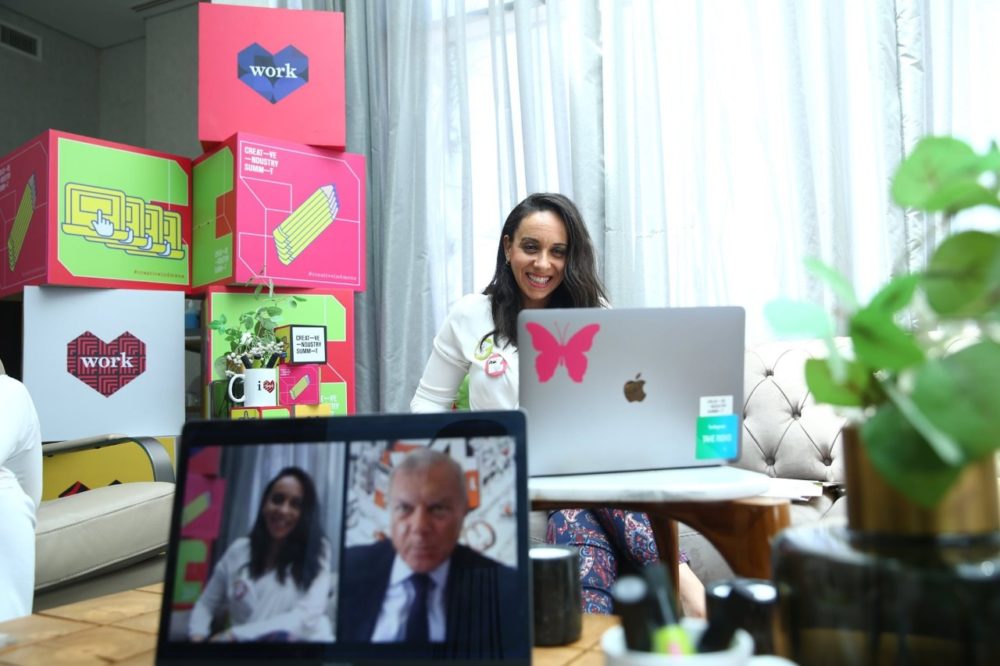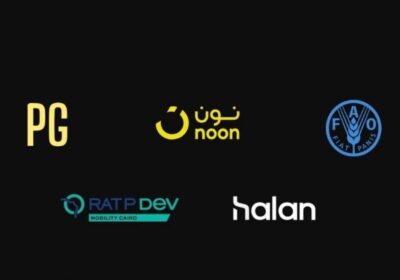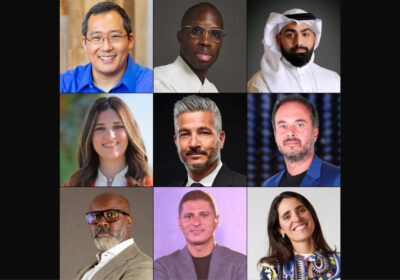For all individuals and businesses whose work has creativity at its heart, the Creative Industry Summit is a whirlwind of impactful insights, intense discussions and essential networking. The event series has been around for six years (its first edition was launched back in 2014) and always brought top experts, consultants, executives and amateurs together to delve into the most pressing demands, challenges and issues in MENA’s creative industry.
And it’s not all talk… You also get to meet numerous professionals — from entrepreneurs behind early-stage startups swimming against the tide to brand directors in giant multinationals — who present case studies and examples of both success and failure from their creative works. What’s more, being virtual, the edition brought together parties from the creative industry in Egypt and countries around the world!
We were there for the Creative Industry Summit’s first virtual edition, which was brought to us by Mountain View’s Heartwork. We extracted the following insights and takeaways for you. You might agree or disagree with them, but we certainly believe you should consider and think about them, then tell us what you think! To know more about the event’s speakers before you dig in, click here.
1. Your Budget Shouldn’t Necessarily Limit Your Creativity or Reach
This insight may feel quite common and you’ve probably heard it before. You may have even felt or heard that limitations, budgetary or otherwise, may breed creativity. But does this apply to big brands and major celebrities too?
Bel Egypt’s La Vache Qui Rit and the Laughter Box
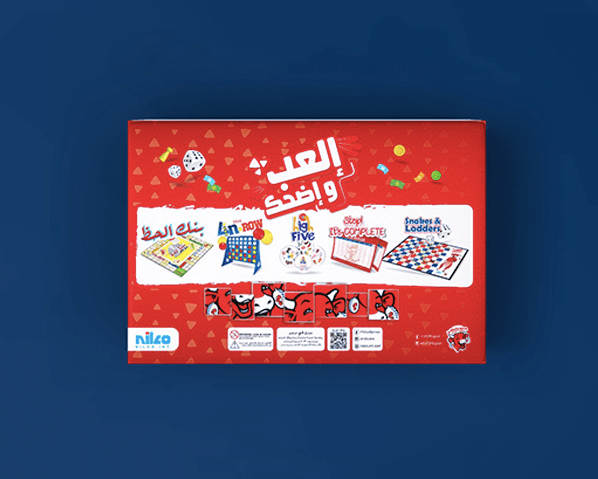
An image of La Vache Qui Rit’s Laughter Box
Bel Egypt’s La Vache Qui Rit went viral during the onset of the COVID-19 pandemic with the Laughter Box, seen below here, and their success story was presented by Rana Anwar — the company’s brand transformation manager — during the Creative Industry Summit. The astounding fact about the campaign was that it had no media budget.
The goal of the campaign was to empower women to choose to stay home and safe in the midst of the virus’ spread. They attempted accomplishing that through sending out kits with nostalgia-evoking board games that millennial moms can play with their children.
Hend Sabry, Inji Ali and Injy El Mokkaddem were among the celebrities that shared the laughter box online with their fan base. It also spread through moms’ communities on Facebook. As the campaign reached more than 3,000,000 women, 10,000 laughter boxes were claimed.
“We bet on people’s goodwill,” explained Anwar during the panel. The request sent alongside the laughter box, Anwar added, was to simply “cascade the happiness and encourage women to choose to stay home and stay positive.”
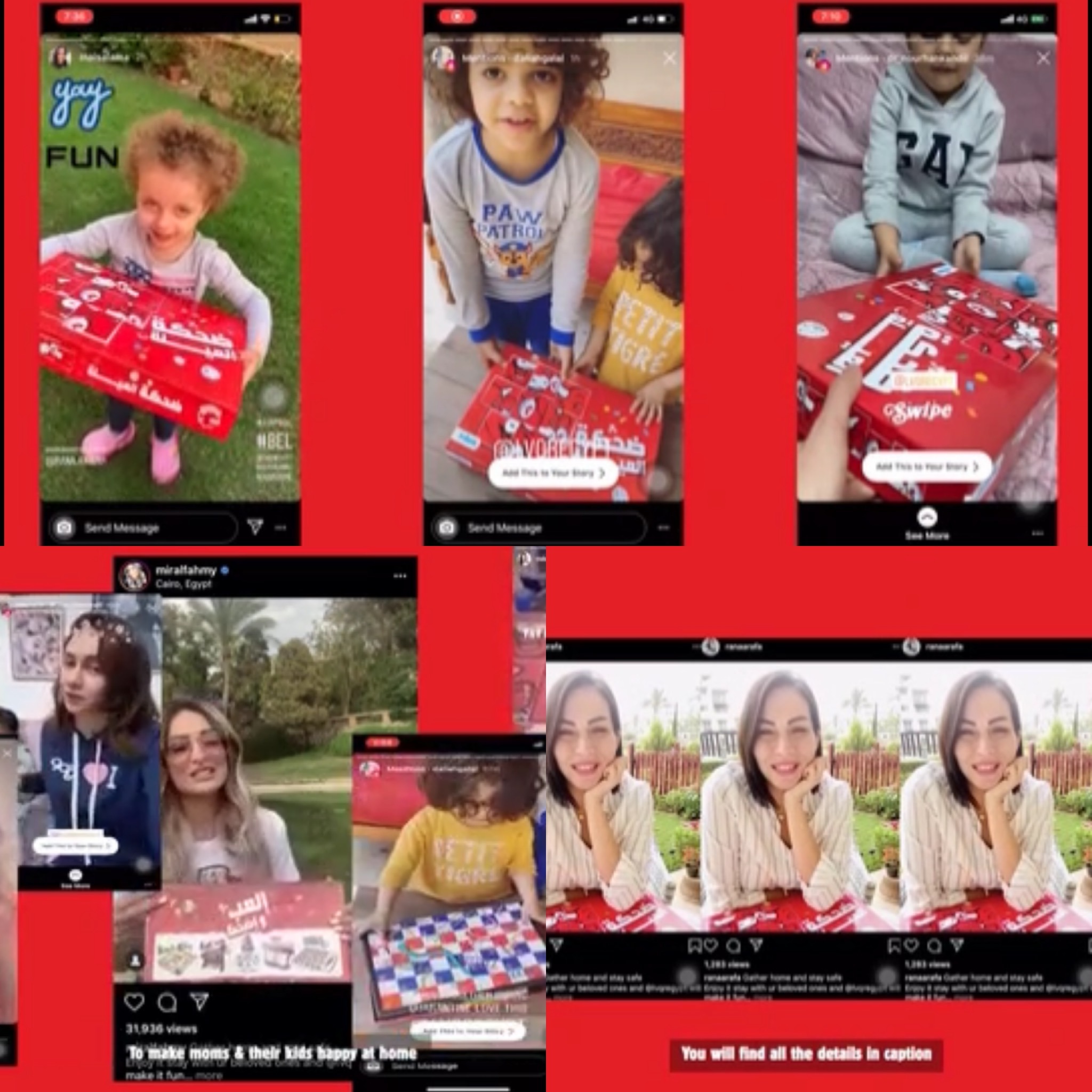
Snapshots from influencers sharing La Vache Qui Rit’s laughter box with their followers on Instagram.
Hend Sabry and Tayarah’s ‘Not Hend Sabry’s Series’
Hend Sabry is most famously known for being a renowned actress, but she’s also the Chairwoman of Tayarah; an Egyptian creative production media hub. The last time Sabry starred in a Ramadan series was back in 2017. In 2020, she was due to make a comeback, but the novel coronavirus pandemic halted it and the series was cancelled.
Her response to the cancellation was to try something she had never tried before: shoot a Ramadan show from home titled ‘Not Hend Sabry’s Series’. The show’s production costs were minuscule and it simply revolved around Hend Sabry chatting with people whose plans, like hers, were cancelled because of the pandemic. The digital mini-series amassed millions of views on Youtube, Facebook and Instagram.
Ramez Youssef, the Chief Creative Officer of Tayarah, discussed the making of the show with Sabry during their session on the summit. In the course of their discussion, Sabry asserted that “money can actually reduce your creativity, not multiply it.” Youssef wholeheartedly agreed.
2. Gaming has Untapped Potential as a Social Network for Digital Marketers

Fortnite, a shooter-based social video game, is quite popular in Egypt and the Middle East.
One of the Creative Industry Summit’s most prominent highlights was a live interview titled ‘The Rise of Gaming as a Social Network’. Famed content creator/vlogger, Mazen Yassin (aka Just a Go Proer), interviewed Jeff Danley. Danley is the director of innovation and eSports at VMLY&R; a global brand experience agency utilizing a “combination of creativity, technology, and culture to create connected brands”. The interview revolved around the potential of gaming as a social network for digital marketers. Here are the main takeaways.
What the Data Says
- Globally, in 2019, the revenue of the total revenue of the gaming industry amounted to $152.1 billion with 2.5 billion players.
- The game, Call of Duty, outsold gigantic movie franchises like Lord of the Rings, Star Wars and Harry Potter.
- Special events, concerts and activations are quite popular on social games like Fortnite.
- According to a report published by Newzoo in 2019, MENA’s gaming industry is forecast to soar by 12.1% during 2019-2022, and that’s the strongest growth rate in the world.
- According to Newzoo’s gaming report of 2020, the COVID-19 pandemic brought on an increase in engagement and revenues with mobile gaming predicted to generate revenues of $77.2 billion during the year growing (+13.3% year on year growth).
Danley’s Advice and Wendy’s Fortnite Activation
Fortnite is an online, shooter competition game. But aside from its shooter-based game modes, it’s also an engaging social network. Within the game, there are special events where weapons and elimination aren’t allowed, these can be concerts and movie screenings. Danley believes this is an area where digital and social marketers can find a lot of untapped potential for success in their campaigns. But, according to Danley, traditional advertising has no place there.
“Brands really have to be careful when entering the gaming space because the gaming market can be quite judgmental towards brands,” warned Danley. “If there is no purpose for that brand to be in he game, typically, the gamers will shut that down and it can turn into a negative experience for the brand as opposed to an opportunity to connect and interact with customers and potential customers,” he clarified.
Danley then gave the summit’s viewers an example from one of his agency’s clients, the American international fast food restaurant chain, Wendy’s. The F&B giants never use frozen beef. They wanted to illustrate that through a clever activation directed at the diverse gamers of Fortnite. The idea they settled on was quite clever and simple: they got into the game, avoided conflict, went to all the various restaurants within the game and destroyed the freezers! “We won quite a few awards for that over the last year,” said Danley proudly.
3. Reputation Should be Among Your Top Priorities

This key insight was mainly extracted from a session titled ‘How to Communicate and Lead in a Crisis’. It was led by Maha Abouelenein, the veteran communications expert with 28 years of international communications experience. Abouelenein works with, Gary Vaynerchuk (also popular as Gary Vee), the cofounder of VaynerX; an outstanding communications company based in New York. Abouelenein is VaynerX’s chief value officer and executive vice president of business development.
Abouelenein’s Main Takeaways
- “Reputation is what matters most. When you think about your reputation, I want you to think about it in terms of currency. What’s its worth? What’s its value? How do you increase the value of your reputation? How do you build your reputation? How do you protect your reputation?”
- “The biggest mistake companies make, is they speak externally before talking internally.”
- “Engage with your press. […] What about talking to the press about the fundamentals of your business, about how you’ve pivoted during this time (coronavirus pandemic), about new ways you’re innovating, about your key employees and some of the hero-like things they’ve been doing this time?”
- “Try to be authentic. Try to be who you really are.”
- “Always think about attracting the attention of a customer, make sure they hear what your brand stands for, connect with them by making them think about your brand and then direct them to a call-to-action.”
- “Everybody has the power to be a powerful personal brand. It just takes two things: one; talk about something that you’re consistently able to do, so it must be something that you’re passionate about, and two; you have to be yourself.”
4. Being a Good Creative Director Isn’t a Pass to Being an A-hole, Become the Charming Provocateur
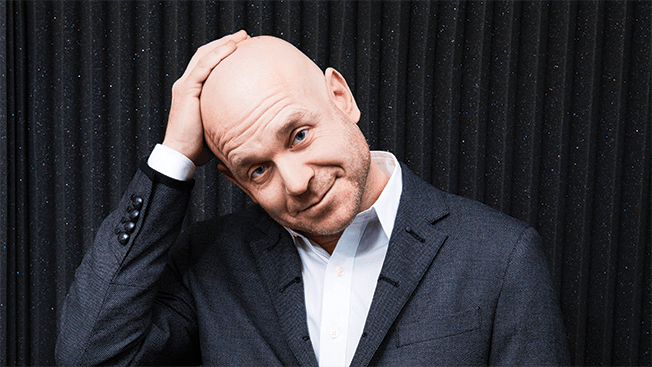
Rob Reilly, global creative chairman at McCain Worldgroup
This insight comes from a session that featured Rob Reilly, the global creative chairman of McCann Worldgroup. Reilly was being interviewed by the cofounder of the Creative Industry Summit, Mai Salama, on ‘Creativity in a Time of Crisis’. During that interview, he recalled the following anecdote.
Back when he was the global chief creative officer of Crispin Porter Bogusky, and shortly after unexpectedly helping the renowned advertising agency score the ‘Agency of the Year” award at the Cannes Lions International Festival of Creativity, Reilly was called in by his partners at the firm because they “have a problem.”
“They said, ‘Well, people think you’re disrespectful.’ And my first reaction was, ‘What do you want me to be? Do you want to be the best agency in the world, to strive for greatness, or do you want me to be a nice guy?'” recalled Reilly during the live session. The CEO back then, Andrew Keller, told him, “You have to be both. […] Everybody is holding on every word or e-mail you say. So, whatever you say that’s gonna be your legacy. So, right now, your legacy is gonna be that you’re an a-hole and you’re disrespectful. So, you have to go to coaching… or you’ll have to leave!”
Reilly chose the coaching option and asserted, “This changed my life. I wouldn’t have the job I have now [otherwise]. I don’t think you can be a jerk anymore.” Reilly’s advice for creatives is to become charming provocateurs. “You have to care about your client’s business more than they do and be intelligent about it,” clarified Reilly, as he stated what it takes to convince a client with a provocative idea. “The world certainly wants more humility from creative directors.”
5. Teams and Businesses Are More Successful the More Diverse They Are
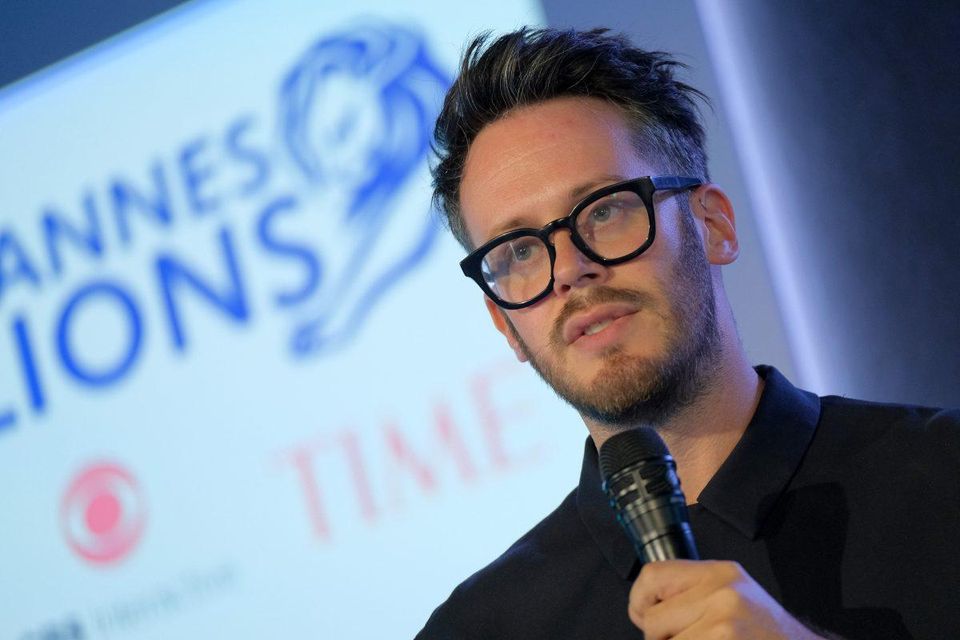
Simon Cook, the managing director of Cannes Lions
The Cannes Lions International Festival of Creativity is often rightfully referred to as the Oscars of the creative industry. The mega event celebrates everything creative and has its own academy. Recently, this academy launched in Egypt. The festival’s managing director, Simon Cook held a session during the Creative Industry Summit’s virtual edition on ‘LIONS Live and the Power of Creativity’. He was being interviewed by Neamat Khalil, the summit’s founding partner.
One of the key subjects Cook tackled during the interview was the significance of diversity within the industry. “The teams are more successful and businesses are more successful the more diverse they are. So, that’s something we’re very aware of and are looking to champion,” asserted Cook.
This of course applies to all industries and not just the creative industry, but it’s an essential reminder nevertheless. Cook then followed it with a call-to-action saying, “So, we’d encourage people from across the global community to get on board.”
6. Past Recessions Tell Us That Increasing Marketing Spend Helps You Recover in the Long-Term

Imaad Ahmed, head of Warc Advisory, EMEA (Europe, Middle East and Africa)
Is your marketing recession-ready? This was the title of the session where Imaad Ahmed, head of Warc Advisory in the EMEA (Europe, Middle East and Africa) region, spearheaded. And given the current circumstances of the world’s economy, such a question is essential.
Warc’s purpose is to derive actionable insights and data that can help agencies and brands avoid ineffective marketing. Ahmed’s presentation contained plenty of actionable insights, statistics and recommendations. One of his recession-related recommendations, however, stood out due to it being somewhat counter-intuitive. That recommendation is to increase marketing and adspend during recessions (the amount of money spent on advertising for a product or activity).
A study from PIMS (Profit Impact of Market Strategies) found that companies that increase marketing spend during a recession recover three times faster in the long-term, according to Ahmed. “Previous recessions have pretty much shown us that if you can maintain your adspend or even increase it, those are the kinds of approaches that are going to help your long-term brand health and brand growth,” he posited. “To understand why that’s the case, we have to come back to this idea and this abiding principle, really, of marketing. And that’s your Excess Share of Voice (ESoV, calculated as Share of Voice – Share of Market),” he elaborated. But Ahmed also warned that this is quite a different recession and this won’t be the same for every brand, and then he proceeded to explain why to the summit’s viewers.
Follow the Creative Industry Summit’s social media on Facebook and Instagram if you’ve got further inquiries and to make sure you don’t miss out on any of there events!

